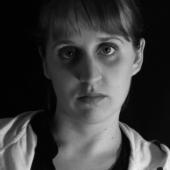A beautiful, but unsatisfying dessert.
If you're craving something decadent, the opening moments of Walking Shadow's Marie Antoinette will hit the spot, highlighting the infamous French queen (Jane Froiland) at the height of her frivolity. Three women in extravagant dresses and even more extravagant hairdos eat bonbons and sip tea, tutting about the peasants and the latest fashions. The light streams through their headpieces, exposing the scaffolding underneath, echoing the elaborate panniers holding up their frocks. We even get to hear her say “let them eat cake.”
But this is not a mere confection. The play seeks to discover the sheltered woman under the outlandish coif and explore the effects of privilege and power. She and her puerile husband Louis XVI (Zach Garcia) are essentially children, completely stunted by their privilege. They never learned how to be humans, just how to be monarchs; improperly educated and poorly prepared for actual governance. Marie, however, bears the brunt of the people's scorn due to both her foreignness and her femaleness. Her fall from grace is larger than life but the piece never quite coalesces into something greater than the sum of its parts.
The pacing and clarity of the play sometimes interferes with the storytelling. In the first act, there are many quick scenes with long transitions, likely to cover for some of the more elaborate costume changes. Some of these transitions are quite charming and well filled, but as the show progresses, the pauses break up the momentum, and the tension built by the ominous rumblings of the offstage peasants somewhat dissipates.
The action spans almost two decades of tumultuous French history, and simple, clear projections of dates and events help anchor us into the story. But with multiple palaces and multiple mobs and various unsuccessful negotiations, a particularly intense scene right before the intermission left my companions and I confused about what had happened.
The second act gets more introspective as Marie transforms from a delicate butterfly pinned to a board to an increasingly desperate mother with no hope of escape. As the walls close in around her, she finds herself wrestling with enormous ideas of power and democracy and what her life truly means. These philosophical discussions are interesting, but don't seem to come from the earlier scenes.
The Marie we've come to know is not given to introspection and big ideas. A lot of things happen to her, but she doesn't have much to do. The contrast between Marie the queen and Marie the prisoner may be a bit too stark to communicate something about the nature of power or the responsibility of governments, or even the story of a woman caught up in the raging tide of history.
There is a lot to recommend about this production. Froiland gives a strong, uninhibited performance in the title role and I particularly enjoyed Neal Beckman's careful inhumanity as Sheep, the queen's erstwhile companion. The costumes and wigs are stunning and carefully render decades of extreme fashion. The lighting was especially effective in the second half as the lavish costumes and locations were stripped away, leaving only a frightened woman in a cell with her nightmares. An important scene was surrounded by the red, white, and blue light of the French flag, or perhaps our own flag.
I'm not sure where the show didn't come together for me, whether it's the script, the pacing, or what I brought into the theater with me in February of 2017. This show was programmed months and months ago, and perhaps it would play differently in the alternate timeline where the election went the other way. The director's notes underscore this with the mirrored exclamations “Lock her up!” and “Let them eat cake!” It's easy to draw parallels between the wild, damaging, and gendered rumors spread about Marie Antoinette and some of the unreliable narratives of the past election. But, Marie's protestations that democracy will fail because the people cannot be trusted to govern themselves are a little harder to hear.
In the end, I'm not sure why we were watching a play about Marie Antoinette today. Not every play has to serve the current cultural moment, this is a play about a political figure in the midst of revolution and I wanted it to take more of a stand. David Adjmi's script is not particularly declarative; there's not quite enough historical detail to serve as a straight biography and not quite enough surrealistic flourishes to serve as an impressionistic dreamscape. There are some great ingredients, but I found myself hungry for something more.




